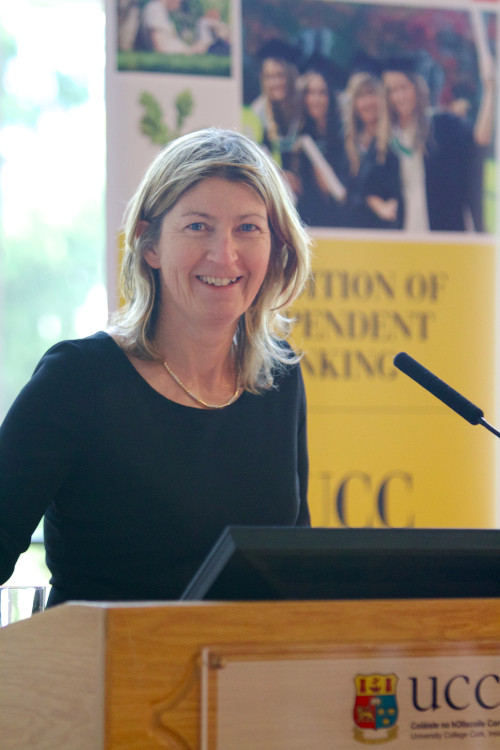Ursula Kilkelly: How remote court hearings present challenges for young people

Ursula Kilkelly
Professor Ursula Kilkelly, from University College Cork, considers the impact of remote hearings on the legal rights of children under Irish and international law.
COVID-19’s public health restrictions have necessitated changes in practice across the legal system. Principal among these is the increased use of remote court hearings where the parties participate in the process by way of video-link. In criminal cases, this has potential to improve the efficient operation of the court system. It also reduces the burden associated with transporting prisoners in and out of court on a daily basis, with the consequent disruption to their lives and the safe running of the prisons.
However, there are risks associated with remote hearings. This is especially so for vulnerable people, for whom it may exacerbate the challenges associated with participating effectively in the criminal process. For children, there are particular reasons why great care should be taken to ensure that the use of remote hearings does not further dilute the legal rights to which children are entitled under Irish and international law.
Government has moved quickly to amend the law to make expanded provision for remote hearings by enacting the Civil Law and Criminal Law (Miscellaneous Provisions) Act. This sets out a range of conditions that must be satisfied before a remote hearing will take place, aiming to ensure that the proceedings will not be prejudicial to the parties or the interests of justice.
It also requires that remote hearings will only proceed where communication between the accused and his/her lawyer is not compromised and where the application in court is otherwise appropriate with regard, along other things, to the age of the relevant person and his/her mental capacity. Notwithstanding the long list of safeguards, much discretion will rest with the judiciary as to when and in what form the remote hearings take place, although this will be informed by Practice Directions to be issued by the judiciary.
Children’s particular circumstances mean that navigating the court process, even where it is adapted to their age and circumstances, is challenging. As a result, the use of remote hearings will inevitably involve significant practical and legal risk. Courts around the world have recognised that children are different to adults in fundamental ways that are material to their treatment in the criminal justice system. Factors relating to children’s development, their appreciation of risk and time, their understanding of decision-making and their capacity to participate effectively in the court process all cast doubt on whether their legal rights can be adequately protected in remote court hearings.
Despite the fact that young people have an express right to participate in court proceedings, research has shown that they find it difficult to understand and engage in the criminal process. Challenges with communication and comprehension are exacerbated in the formal courtroom setting where their demeanour and behaviour can be misunderstood. Their undeveloped capacity can mean that they struggle to appreciate the gravity of their circumstances and their judgement can be influenced more by short-term gains, like having the hearing over quickly, than a long-term consideration of what is in their interests.
Children can struggle to instruct their lawyers, especially those who are not specially trained to deal with children, and this disadvantage may be exacerbated where the lawyer is at one end of the video link and the child is at the other end. The Children Act 2001 requires the child’s parent to be present at such proceedings and even where that is possible – some parents are not actively involved in their children’s lives – it will place a heavy burden on parents to expect them to support their child to navigate a remote court process.
Communication with the judge can be difficult where a child appears in court in person as the formal environment of a criminal trial, where there is much at stake, can be very intimidating for a child. This is likely to be worsened when the child is required to communicate via video link with both the judge and their solicitor in the courtroom when the child remains in custody, normally in Oberstown Children Detention Campus.
While some children who may present poorly when physically in court may benefit from a remote hearing, it is equally possible that the opportunity for constructive dialogue between the court and the child will be hampered, if not lost altogether, through a video-link. Court personnel and legal representatives will no doubt be alert to the challenges that children may face in such a situation, and may, for instance, proactively prompt the child to seek an adjournment where confidential legal consultation is required. But, it would be unusual for a young person to have the confidence or indeed the capacity to understand the need and importance of making such a formal intervention in these circumstances. This is especially the case where the eye contact and other cues are not available.
But that is not to say that remote hearings have no benefit for children. Young people in Oberstown on remand and detention orders attend court on a regular basis for a range of reasons. As this is a national facility, court appearances can take place anywhere in the country and significant time and resource is expended bringing young people safely to and from their court appearances. This practice can pose significant risks to the welfare of young people and to the security and stability of Oberstown.
For young people, physical court appearances can be disruptive to their routine. They miss school and other appointments essential to their care and well-being and the travel or waiting time can have an unsettling effect generally. At the same time, the opportunity to attend court has the benefit of enabling them to see family members. Sometimes, they will seek to acquire drugs or other substances either for themselves or others, with risks to the welfare of young people and Oberstown security as a result. Court visits present a risk that a young person will bring COVID-19 onto the Campus, which has remained virus-free to date.
For all of these reasons, it is legitimate to seek to minimise physical appearances in court and to seek an approach whereby such court visits take place only when strictly necessary. However, it is not evident that the significant risks involved in using remote hearings in children’s cases for anything but the most minor of matters could be safely mitigated. It is for this reason that countries like New Zealand – known for its progressive approach to youth justice – strongly discourages remote hearings for children and similar reviews in Australia have also opposed their introduction.
Before proceeding to apply the new legislation to children’s cases, consideration should be given to documenting the serious risks to the justice process of remote hearings involving children, and the risks to their right to participate effectively in the criminal process, required by law. Attention should be given to the various measures required to mitigate these risks, such as introducing formal legal supports that enable the child’s understanding of and participation in the court proceedings, support for the parents and other means of ensuring that all measures taken are consistent with their legal rights and aware of their very particular circumstances. Without these measures, none of the practical advantages associated with remote hearings could justify the serious legal risks to the rights of the child.
Professor Ursula Kilkelly is a professor of law and head of the college of business and law at UCC. She is an Irish Research Council awardee and is Chair of the Board of Management, Oberstown Children Detention Campus. This article first appeared on RTÉ Brainstorm.









